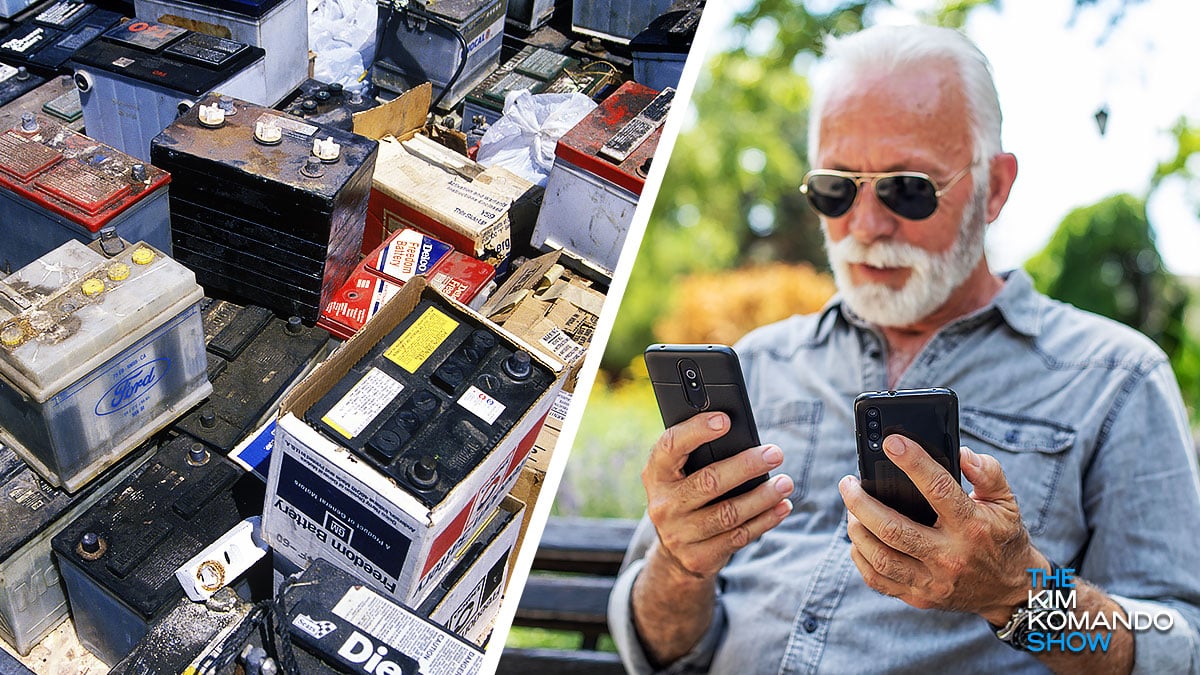There is more concrete used in construction than any other material. More than wood, steel and even glass. So what makes this super-substance so strong, and how did humans perfect it over 2,000 years ago?
7 things you should never throw away (or you could be in legal trouble)

By now, we all know how to separate trash from recyclables.
But what about the other things we no longer need? The answer is no if you’re holding an old bottle of medication. Tap or click here to check if any of your meds have been recalled.
Motor oil, engine coolant and other vehicle chemicals must also be disposed of properly. Speaking of cars, you don’t need a brand new one to get today’s tech inside. Tap or click for affordable upgrades you can make to your older car.
Many everyday items have their methods of safe disposal. Note: I include general guidelines here, but you always check with your local waste authority to be safe.
1. Household batteries
Batteries are broken down into two broad categories: Single-use and rechargeable. How you dispose of them is quite different.
- You can usually throw away standard alkaline batteries (AA, AAA, 9-volt and the like) that power your remote control, flashlight, and other everyday household items in the trash.
- Button cell or coin batteries — the kind you’ll find in calculators, watches, hearing aids and car key fobs — may contain silver and mercury and should not be thrown away in the trash. Bring them to a battery recycler or participating retailers that provide battery takeback services.
- Lithium-ion and nickel-cadmium batteries are most commonly found in cellphones, laptops, tablets, digital cameras, power tools, and toys. These batteries should never be tossed in the trash or recycle bin. They must be taken to separate recycling or household hazardous waste collection centers.
- Small, sealed lead acid batteries are found in emergency devices, security systems, mobility scooters, and other special-use items. These also need to be taken to special disposal centers.
To find more recycling and disposal information, go to this resource page at Earth911. Select a type of battery from the left drop-down menu and enter your ZIP code. Note that stores like Staples, Home Depot, and Best Buy have battery drop-off programs.
One of my show’s most common battery questions is, “What’s the best way to make my phone’s battery last longer?” Tap or click here for a few secrets to get more life out of yours when you’re not near a charger.
2. Smartphones and tablets
There’s no way to remove the battery from many smartphones or tablets. Don’t simply chuck these devices in the trash, as the batteries can cause fires.
So, what should you do with it? Try trading in the old device when purchasing a new one. Most manufacturers will recycle it for free even if you don’t get credit for it. Check out Apple’s program, for example.
Use this anti-microbial screen protector to keep your iPhone germ-free

Let’s be honest: Cell phones are filthy. Right now, you’re probably more aware than ever of how many germs may be hiding in plain sight.
We’re in the middle of a pandemic, so it’s important to be more germ and microbe conscious. That means wiping things down and sanitizing everything you touch. Tap or click here for the CDC list of disinfectants that can kill coronavirus germs.
The incredible history of concrete
Pens that do more than write
- Cleaning grout is a pain. Try a pen that restores the color and removes crud.
- Make your jewelry sparkle with a top-rated pen that cleans diamonds, precious metals and whatever else ya got. (Best $10 you’ll spend this month.)
- A purse, bag and desk drawer staple for the clumsy among us: A Tide pen.
- Know which glass (wine or otherwise) belongs to each person with colorful pens meant specifically for writing on glass.
- Write checks no one can wash with these Uniball pens I like. They’re around $9 for a four-pack right now.
We may receive a commission when you buy through our links, but our reporting and recommendations are always independent and objective.
$7,100 for a PC case
InWin’s Infinite clocks in at 100 pounds. It has 180-degree curved glass, diamond-cut edges and a mechanical hinge that opens with the press of a button. Each glass panel takes about 12 hours to mold. Uh, don’t drop it.
Coronavirus germs can survive on your smartwatch - here's how to disinfect it

Coronavirus and COVID-19 have people around the world rethinking their hygiene habits. In 2018, a CDC study revealed only 31% of men and 65% of women wash their hands after using the restroom. Flash forward to today and you’ll be lucky to find any soap left in bathroom soap dispensers.
Plant savers
I have a new plant on my desk at work — a little pothos. I can’t let it sit there parched all weekend, so I went looking for a solution. Found some good ones!
- Water pots: These ingenious little plastic pots ($13.99 for five) have a water reservoir at the bottom, a cotton wick that sucks up the water and a watering hole for top‑ups.
- Electric: Be an indoor irrigator with this automatic watering system (40% off). This seemed like overkill for my little pothos, but maybe not for your indoor garden or a big plant!
- Bulbs: Fill up these pretty hollow glass lollipops ($13.99 for two), flip ‘em over quickly, stab them into the soil, and your plant will slowly siphon out the water. This is the one I got!
We may receive a commission when you buy through our links, but our reporting and recommendations are always independent and objective.
